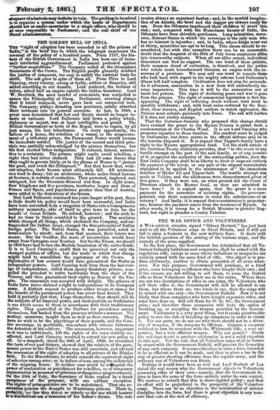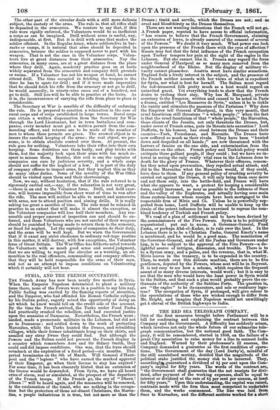THE WAR OFFICE AND VOLUNTEERS.
A WAS-omez circular, signed "Sidney Herbert," has just been sent to all the Volunteer corps in Great Britain, and it will not fail to raise a ferment in the new military force. It deals with the ticklish question of the arming of the various corps, and the custody of the arms supplied. In the first place, the Government has determined that all Vo- lenteer Infantry battalions and companies, shall be armed with the regulation rifle, except in cases where battalions or companies are entirely armed with the same kind of rifle. One object is to pro- duce uniformity, another to obtain possession of all arms what- ever. Por this purpose, Gel/ern/tent will purchase, at a fixed price, arms belonging to riflemen who have bought their own ; and if the owners are not willing to sell them, to issue the Enfield rifle to these Volunteers for their use in the ranks. Where there are not two descriptions of rifles in one corps, the Volunteers *the sell their rifles to the Government will still be sneered to nee them, but where there are two kinds in use, then the corps will be armed with one only—the Government Enfield. Now it is not likely that those companies who have bought expensive rifles, and some have done so, will sell them for 3/. 2e. 6d., the Government price ; and therefore these companies will have the option Of breaking up, or accepting the weapon provided by the Govern- ment. Uniformity is a very good thing, but it seems questionable policy to run the risk of breaking up companies in order to obtain it. For our parts, we do not see why there should not be a diver- sity of weapons, if the weapons be efficient. Suppose a company resolved to arm its members with the Whitworth rifle, a very ex- pensive, but a very efficient weapon. Why not permit ? Surely the re-tape desire to produce uniformity is not a valid objection in this ease. Yet the rule that all Volunteer corps shall in future
be armed with the Government Enfield, will prevent the formation of any such company. It seems ridiculous to raise a force intended to be as efficient as it can be made, and then to place a bar in the way of greater shooting e cietcy than the regular army, and the ordinary run of Volunteers can attain. Perhape it would have been as well had Lord Herbert of Lea
stated the real reason why the Government objects.to Volunteers possessing rifles of their own—namely, that the Government de- sires to have the arms of the force entirely under its own control. We venture to submit that this is short-sighted Polity; and that its effect will be prejudicial to the prosperity of the Volunteer army. There can be no objection to the introduction of stricter discipline into the foresee but there is great objection to any mea- sure that cuts at the root of efficiency.
The other part of the circular deals with a still more delicate subject, the custody of the arms. The rule is, that all rifles shall be deposited in the armouries. We venture to say that, if this rule were rigidly enforced, the Volunteers would be as inefficient a corps as can be imagined. Drill without arms is useful, nay, indispensable, at first. But it is drill with arms that makes the soldier efficient. In the Regular Army, where soldiers live in bar- racks or camps, it is natural that arms should be deposited in armouries, because the soldier is supposed never to part with his weapon. That is not the ease in the Volunteer corps. Volun- teers live at great distances from their armouries. Nay the armouries, in many cases, are at a great distance from the place where they drill. Again, musketry practice goes on at butts widely separated from the armouries and company drill grounds or rooms. If a Volunteer has not his weapon at hand, he cannot attend drill. The time occupied in fetching the weapon is the time he has to spare for drill ; and if it were made imperative that he should fetch his rifle from the armoury or not go to drill, he would assuredly, in ninety-nine cases out of a hundred, not go to drill. Still less will he be able to practice at the butts. As it is, the inconvenience of carrying the rifle from place to place is considerable.
The Secretary at War is sensible of the difficulty of enforcing the rule. He is prepared to sanction a relaxation in the case of rural corps and of corps established in large towns. Rural corps can obtain a written dispensation from the Secretary for War through the Lord Lieutenant, but in town battalions and com- panies, every member must get a written permit from the com- manding officer, and returns are to be made of the number of men to whom these permits are given. The avowed object is to insure the careful keeping of the arms ; the real object, we pre- sume, is to obtain absolute control over them. At present, the rule goes for nothing. Volunteers take their rifles into their own keeping. Some doubtless use them badly, and play tricks with them, but the majority look upon their arms with too much re- spect to misuse them. Besides, this evil is one the captains of companies can cure by judicious severity, and a whole corps should not suffer for the neglect of a few. It is part of the duty of company officers to inspect arms, but they neglect this as they do many other duties. Some of the severity of the War Office should be visited upon them and their shortcomings. Now, we say, without hesitation, that if the rule referred to is rigorously carried out,—nay, if the relaxation is not very great, —there is an end to the Volunteer force. Drill, and field exer- cise, will become impossible from sheer want of time to run after the rifle. The men will neither be able to march and manoeuvre with arms, nor to attend position and aiming drills. It is really asking too great a sacrifice of time. The rule must be relaxed in practice to an extent that will make it almost the exception, or the Volunteer companies will lose half their members. Any rea- sonable and proper amount of inspection can and should be en- forced, and those Volunteers who are not careful of their weapons should be punished by being made to return them to the armoury, or fined for neglect. Let the captains of companies do their duty, and the arms will be well kept. But we warn the Government that if it exact any strict obedience to ordinary red-tape routine in this matter, it will destroy, with few exceptions, the Volunteer force of Great Britain. The War Office has hitherto acted towards the Volunteers with so much good sense and sound judgment, that we are willing to regard the circular as a warning, an ad- monition to the real offenders, commanding and company officers, that they will be held responsible for the arms of their men, and not as an attempt to impose conditions on Volunteering which it certainly will not bear.



























 Previous page
Previous page